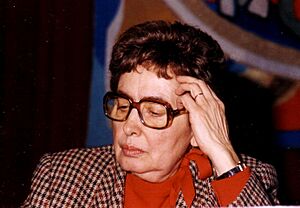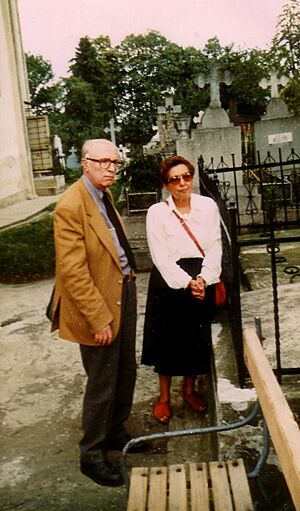Monica Lovinescu facts for kids
Monica Lovinescu (born November 19, 1923 – died April 20, 2008) was a famous Romanian writer, critic, translator, and journalist. She was well-known for speaking out against the Communist government in Romania. She sometimes used the pen names Monique Saint-Come and Claude Pascal. Monica was the daughter of the important writer Eugen Lovinescu. She was married to another literary critic, Virgil Ierunca.
Contents
Early Life and Move to France
Monica Lovinescu was born in Bucharest, Romania. She studied at the University of Bucharest. Her first writings appeared in Vremea magazine. She also wrote for Revista Fundațiilor Regale and Democrația.
In September 1947, Monica went to France on a scholarship. The Communist government was quickly taking over Romania. Because of this, she asked for political protection in August 1948. This meant she could stay in France and not return to Communist Romania.
Fighting Communism Through Writing
Monica Lovinescu wrote many articles about communism in her home country. She also wrote about Romanian literature. Her articles appeared in important magazines like Kontinent, Les Cahiers de l'Est, and L'Alternative. She even wrote a part of a book called Histoire des spectacles.
Broadcasting for Freedom
From 1951 to 1974, Lovinescu worked for Radiodiffusion Française, which broadcasted in Romanian language. Starting in the 1960s, she became a journalist for Radio Free Europe. This radio station broadcasted into Communist countries.
Monica created two weekly radio shows. These shows were very important in helping people inside Romania stand up to the government of Nicolae Ceaușescu. Her main goal was to tell Romanians about what was happening in the Free World. Some of her radio scripts were later published in a book called Unde Scurte ("Shortwaves").
Her weekly radio shows, Theses and Antitheses in Paris and Romanian Cultural Current Affairs, were listened to by many Romanians. They secretly tuned in to Radio Free Europe from behind the Iron Curtain. Her voice gave them hope.
Facing Challenges
Monica Lovinescu was often attacked by the Communist press in Romania. Journalists like Eugen Barbu and Corneliu Vadim Tudor wrote harsh things about her. A Romanian defector, Ion Mihai Pacepa, said that in 1977, she was badly beaten. This attack was supposedly ordered by Ceaușescu.
Translator and Legacy
Monica Lovinescu also translated many Romanian books into French. She passed away in Paris in 2008.
In December 2023, a special monument was built in Bucharest. It features statues of Monica Lovinescu and Virgil Ierunca. It also includes a "tree of evil," which represents the secret police agents who tried to spy on Radio Free Europe. This monument honors their fight for freedom.
 | Anna J. Cooper |
 | Mary McLeod Bethune |
 | Lillie Mae Bradford |



